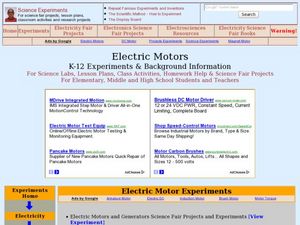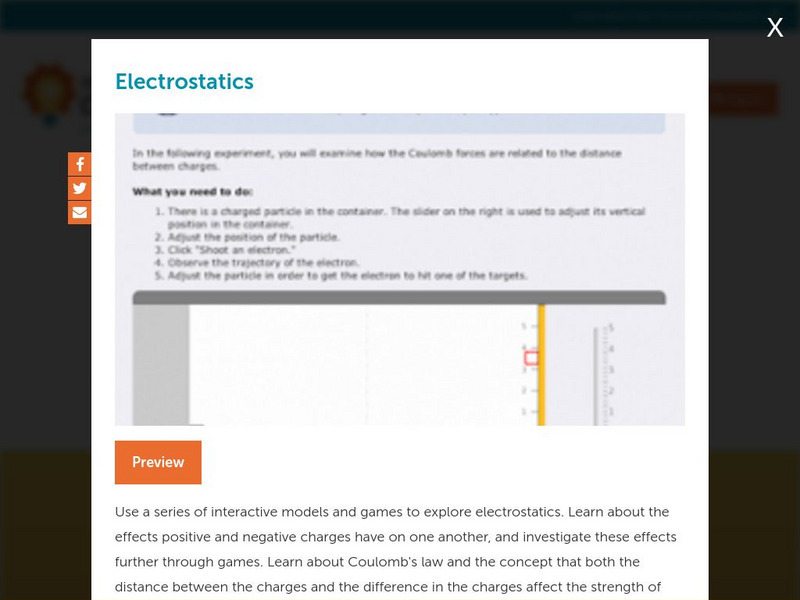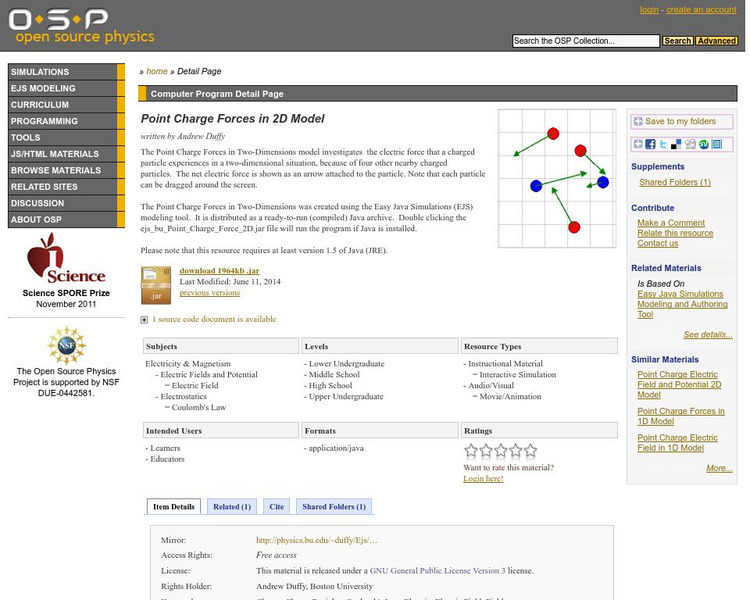Curated OER
Bonding
In this word search learning exercise, students locate 12 words related to molecular bonding. Words include molecule, ions, forces, polarity, partial, and particles.
LABScI
Atomic Structure and the Periodic Table of Elements: The Secret Agent Lab
Food always gets attention! Model atomic structure using fruit loops to represent the subatomic particles. After building models, scholars create ionic bonds using their models. Finally, they use these concepts to create a periodic table.
National Energy Education Development Project
Introduction to Solar Energy
People have been using solar energy for many generations to dry crops, heat homes, and for light. This presentation explains how now it is possible to capture the solar energy and store it for future use, details how and where people use...
Cornell University
Splitting Water with Electricity
Explore how electricity splits water molecules into hydrogen and oxygen. Learners begin by calculating the voltage necessary to separate the water. They then perform the experiment and measure the ratio of hydrogen and oxygen bubbles.
Curated OER
Electroscope
Learners examine what an electroscope is and who invented it. In this electrical lesson students build their own Emergency Radiation detector Electroscope.
Curated OER
Electric Motors
Learners examine the different types of electric motors including their history and classification. In this motor lesson students complete several experiments with different motors.
Curated OER
Ionic Bonding
In this ionic bonding worksheet, students observe diagrams about ionic bonds and crystal formation. They answer 37 short answer questions about the properties of monatomic ions, polytomic ions and write correct formulas.
Curated OER
A Model of a Scanning Tunneling Microscope
Ninth graders explain how a scanning tunneling microscope works. In this chemistry lesson, 9th graders construct atomic models and simulate how their images appear under the STM. They discuss the limitations of their atomic model.
Curated OER
Doing Lewis Dot Diagrams
Students observe the periodic table and draw the Lewis Dot Diagram. In this investigative lesson students construct information on several elements including the Lewis Dot Formation and take a quiz on the information they learned.
Curated OER
Electrical Generators
Students study what an electric generator does and its history. In this energy lesson students complete several experiments including building their own electric generator.
Curated OER
Magnetic Levitation
Students conduct a series of experiments on magnetic levitation. In this physics lesson, students discover how Maglev trains operate. They explain how magnetism make even simple objects levitate.
Curated OER
Take Charge!
Students induce an electrical charge on various objects, and experiment with electrical repulsion and attraction. They define related vocabulary, play Bingo and complete a take-home quiz.
Curated OER
Static Cling
Students work together to discover the concept of static electricity. They participate in an experiment in which they test different objects charge. They make observations and record them for later use.
Curated OER
Polymers
Students explore online tutorial on polymers. In this chemistry lesson, they create two polymers in the lab and compare their properties. They write a sales letter about their new and improved polymer product.
Curated OER
Characteristics of Crystals
In this crystals worksheet, students complete a graphic organizer by filling in the characteristics of the different crystal types including melting/boiling point and electrical conductivity.
Curated OER
Alessandro Volta: The Invention of the Voltaic Pile (The First Electric Battery)
Students conduct a series of experiments on electricity. In this physics lesson, students study the work of Alessandro Volta particularly his experiment on the the Voltaic Pail. They build their own Voltaic Pile to recreate his experiment.
Curated OER
Charge It!
Students complete an experiment using balloons to help them examine the concept of static electricity. They discover how engineers use this information to create better air filters for homes. They describe how to charge an insulator as...
Physics Aviary
Physics Aviary: Electrostatic Force Mini Lab With Numbers
This mini lab was designed to visually illustrate the relationships between the force of electrostatics and the factors that determine its strength.
Physics Aviary
Physics Aviary: Electrostatic Force Mini Lab *
This mini lab was designed to visually illustrate the relationships between the force of electrostatics and the factors that determine its strength.
Concord Consortium
Concord Consortium: Stem Resources: Electrostatics
This web-based activity takes students through a series of pages in which they find out about the effects charged particles have on one another, discover how Coulomb's force works, and see some real-world examples. Multiple-choice and...
Concord Consortium
Concord Consortium: Electrostatics
Use a series of interactive models and games to explore electrostatics. Learn about the effects positive and negative charges have on one another, and investigate these effects further through games.
National High Magnetic Field Laboratory
Magnet Academy: Electrostatic Repulsion in Van De Graaff Bubbles
A fun look at how Van de Graaff generators illustrate electrostatic forces. (Java tutorial)
American Association of Physics Teachers
Com Padre Digital Library: Open Source Physics: Point Charge Forces in 1 D Model
Virtual simulation investigating the electric force that one charged particle exerts on another. Plot a graph of the electric force as a function of position.
American Association of Physics Teachers
Com Padre Digital Library: Open Source Physics: Point Charge Forces in 2 D Model
In this simulation, examine the electric force that a charged particle gains from nearby charged particles in a two-dimensional state. See the net electric force shown as an arrow attached to the particle.
























